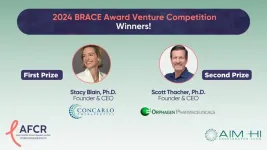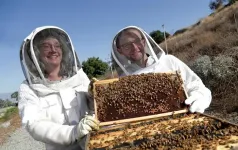How fish guts might play a role in future skin care products
2024-09-05
(Press-News.org) There are some pretty strange ingredients in cosmetics and skin care products. One example is snail mucin — also known as snail slime — which is used for its moisturizing and antioxidant properties. But researchers reporting in ACS Omega might have found something even weirder to put on your face: molecules made by fish gut bacteria. In cultured cells, the compounds had skin-brightening and anti-wrinkle properties, making them potential ingredients for your future skin care routine.
Though fish guts might seem like the absolute last place to look for cosmetic compounds, it’s not a completely far-fetched idea. Many important drugs have been found in bizarre places — famously, penicillin’s antibiotic properties were discovered after a failed experiment got moldy. More recently, the brain cancer drug candidate Marizomib was derived from microbes unearthed in marine sediments at the bottom of the ocean. Two potentially untapped sources of new compounds could be the gut microbes of the red seabream and the blackhead seabream, fish found in the western Pacific Ocean. Although these microbes were first identified in 1992 and 2016, respectively, no studies have been performed on the compounds they make. So, Hyo-Jong Lee and Chung Sub Kim wanted to see if these bacteria produce any metabolite compounds that could have cosmetic benefits.
The team identified 22 molecules made by the gut bacteria of the red seabream and blackhead seabream. They then evaluated each compound’s ability to inhibit tyrosinase and collagenase enzymes in lab-grown mouse cells. (Tyrosinase is involved in melanin production, which causes hyperpigmentation in aging skin. Collagenase breaks down the structural protein collagen, causing wrinkles.) Three molecules from the red seabream bacteria inhibited both enzymes the best without damaging the cells, making them promising anti-wrinkle and skin-brightening agents for future cosmetic products.
The authors acknowledge funding from the Marine Biotechnology Program of the Ministry of Oceans and Fisheries, the National Research Foundation of Korea, the Technology Development Program of the Ministry of Small and Medium Enterprises and Startups, Sungkyunkwan University and the BK21 FOUR program of the Ministry of Education of Korea.
###
The American Chemical Society (ACS) is a nonprofit organization chartered by the U.S. Congress. ACS’ mission is to advance the broader chemistry enterprise and its practitioners for the benefit of Earth and all its people. The Society is a global leader in promoting excellence in science education and providing access to chemistry-related information and research through its multiple research solutions, peer-reviewed journals, scientific conferences, eBooks and weekly news periodical Chemical & Engineering News. ACS journals are among the most cited, most trusted and most read within the scientific literature; however, ACS itself does not conduct chemical research. As a leader in scientific information solutions, its CAS division partners with global innovators to accelerate breakthroughs by curating, connecting and analyzing the world’s scientific knowledge. ACS’ main offices are in Washington, D.C., and Columbus, Ohio.
Registered journalists can subscribe to the ACS journalist news portal on EurekAlert! to access embargoed and public science press releases. For media inquiries, contact newsroom@acs.org.
Note: ACS does not conduct research but publishes and publicizes peer-reviewed scientific studies.
Follow us: X, formerly Twitter | Facebook | LinkedIn | Instagram
END
ELSE PRESS RELEASES FROM THIS DATE:
2024-09-05
How does your dip in a local watering hole affect the stream’s chemistry? Researchers who previously analyzed the impact of people swimming and tubing on a Colorado creek report updated observations in ACS ES&T Water. They find that these recreational activities over a busy Labor Day weekend have a short-term effect, increasing the levels of metals, human gut-associated microbes and substances from personal care products.
Researchers James Ranville, Carsten Prasse, John Spear, Noor Hamden, Carmen Villarruel and colleagues studied how recreational ...
2024-09-05
Hong Kong (5 September 2024) – The Asian Fund for Cancer Research Limited (AFCR) is pleased to announce the winners of the 2024 BRACE Award Venture Competition: the First Prize goes to Concarlo Therapeutics, led by Founder and CEO Stacy Blain, Ph.D., and the Second Prize goes to Orphagen Pharmaceuticals, led by its Founder and CEO Scott Thacher, Ph.D.
AFCR’s BRACE (Bridging Research from Academia to Cancer Entrepreneurship) Award Venture Competition is designed to support and accelerate oncology innovations on their path toward commercialization, aiming to improve outcomes for patients affected by cancer globally. ...
2024-09-05
Research Highlights:
In an analysis of 18 randomized clinical trials, people with obesity and high blood pressure who underwent bariatric (weight-loss) surgery were almost three times more likely to achieve blood pressure remission, defined as reducing to less than 140/90 mm Hg and no longer taking antihypertensive medication, and keep it under control in comparison to peers treated with medication and healthy lifestyle adjustments.
Over a 1-to-5-year follow-up period, people with obesity who ...
2024-09-05
PULLMAN, Wash. — A new application that uses artificial intelligence may revolutionize the way scientists study hair and could lead to the development of health diagnostics based solely on hair.
The AI model speeds up and streamlines the hair quantification process, allowing a microscope to scan slides and collect images of hundreds of hairs at a time. In a matter of seconds, it can capture an abundance of high-resolution data that is then processed with a deep learning algorithm that collects the color, shape, width and length of each individual hair. Researchers tested it using mouse fur, but it could be ...
2024-09-05
A combined 4.8 million euros in ERC Starting Grants will go to scientists at the Institute of Science and Technology Austria (ISTA). Awarded to early career researchers by the European Research Council (ERC), Starting Grants help researchers launch and develop projects, build capable teams, and pursue cutting-edge research. All three of ISTA’s ERC winners wholly embody the Institute’s curiosity-driven mission: they aim to find out how cells keep time, improve the way we date our stars, and optimize the extraction of relevant information from our ever-growing data.
ERC Starting Grants ...
2024-09-05
Drs Johanna Vos has won a highly prestigious European Research Council (ERC) Starting Grants to pursue research aimed at better understanding weather patterns in extrasolar worlds deep in the galaxy.
Dr Vos’ project: Exometeorology: Probing Extrasolar Atmospheres (Exo-PEA)
Over the past 30 years, astronomers have uncovered thousands of new extrasolar planets, which vary from small, rocky worlds, to giant planets like Jupiter. Additionally, lots of isolated or free-floating worlds have been discovered. We have already learned that the atmospheres of these strange worlds are highly complex, hosting a range of weather processes.
The launch of the James Webb Space Telescope ...
2024-09-05
Iliana Ivanova, Commissioner for Innovation, Research, Culture, Education and Youth, said: “The European Commission is proud to support the curiosity and passion of our early-career talent under our Horizon Europe programme. The new ERC Starting Grants winners aim to deepen our understanding of the world. Their creativity is vital to finding solutions to some of the most pressing societal challenges. In this call, I am happy to see one of the highest shares of female grantees to date, a trend that I hope will continue. Congratulations to all!”
President of the European Research Council, Prof. ...
2024-09-05
Dr Michael-John Dolan has won a highly prestigious European Research Council (ERC) Starting Grants to pursue research aimed at uncovering the secrets of brain disorders and repair.
Dr Dolan’s project: MICRODISSECT: Dissection of Microglial State Biology in Brain Repair
Dr Dolan’s research will focus on microglia, the brain's resident immune cells, which can form distinct subtypes, or “states” – especially during brain damage, disease, or repair. While microglia are crucial for regulating neuroinflammation and brain repair, these states are poorly understood ...
2024-09-05
If you upset one bee, what determines whether the entire hive decides to avenge her grievance? A $1.2 million grant will support UC Riverside scientists in answering questions like these about how honeybees communicate.
Every third bite of food you eat has been pollinated by a bee. They are central to worldwide food production, but there have been an alarming number of die-offs recorded since 2006. One solution to this issue is the use of special survivor bees that are more resistant to pests and diseases that are killing managed honeybees.
Commonly found in ...
2024-09-05
“We are extremely happy about the freshly granted ERC project for Hannah Schneider. Thereby, the European Research Agency distinguished a highly talented young researcher, who develops new ideas and approaches to explore anatomical roots traits that are highly relevant for stress tolerance and resource efficiency of crops”, says Prof. Dr. Nicolaus von Wirén, Managing Director at IPK. “The new ERC project of the scientist from Minnesota, whom we allured to IPK just last October, follows the two previous ERC-Starting Grant holders Martin Mascher and Stefan Heckmann and will bring great international visibility to root research at IPK.”
“The ...
LAST 30 PRESS RELEASES:
[Press-News.org] How fish guts might play a role in future skin care products





